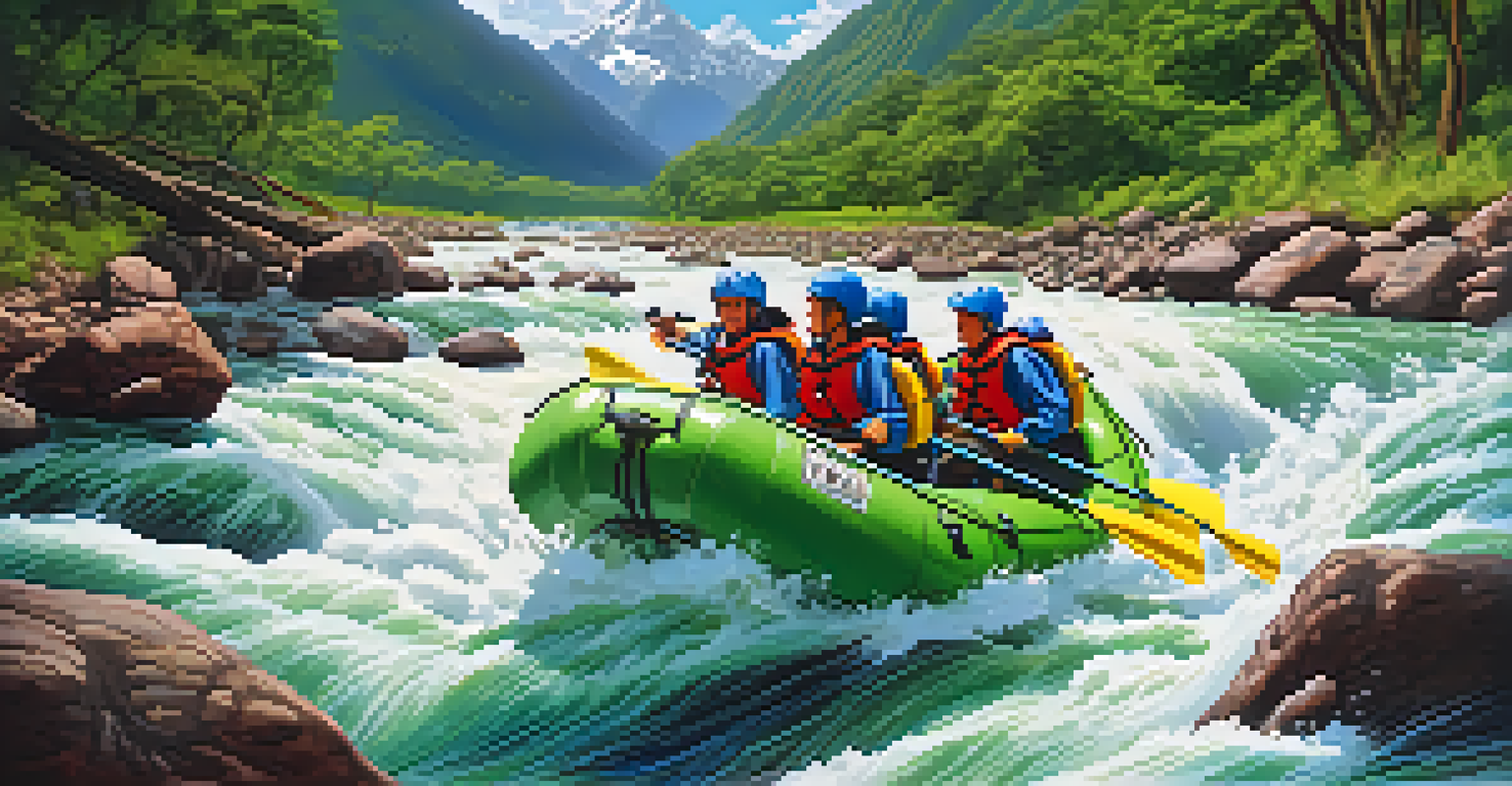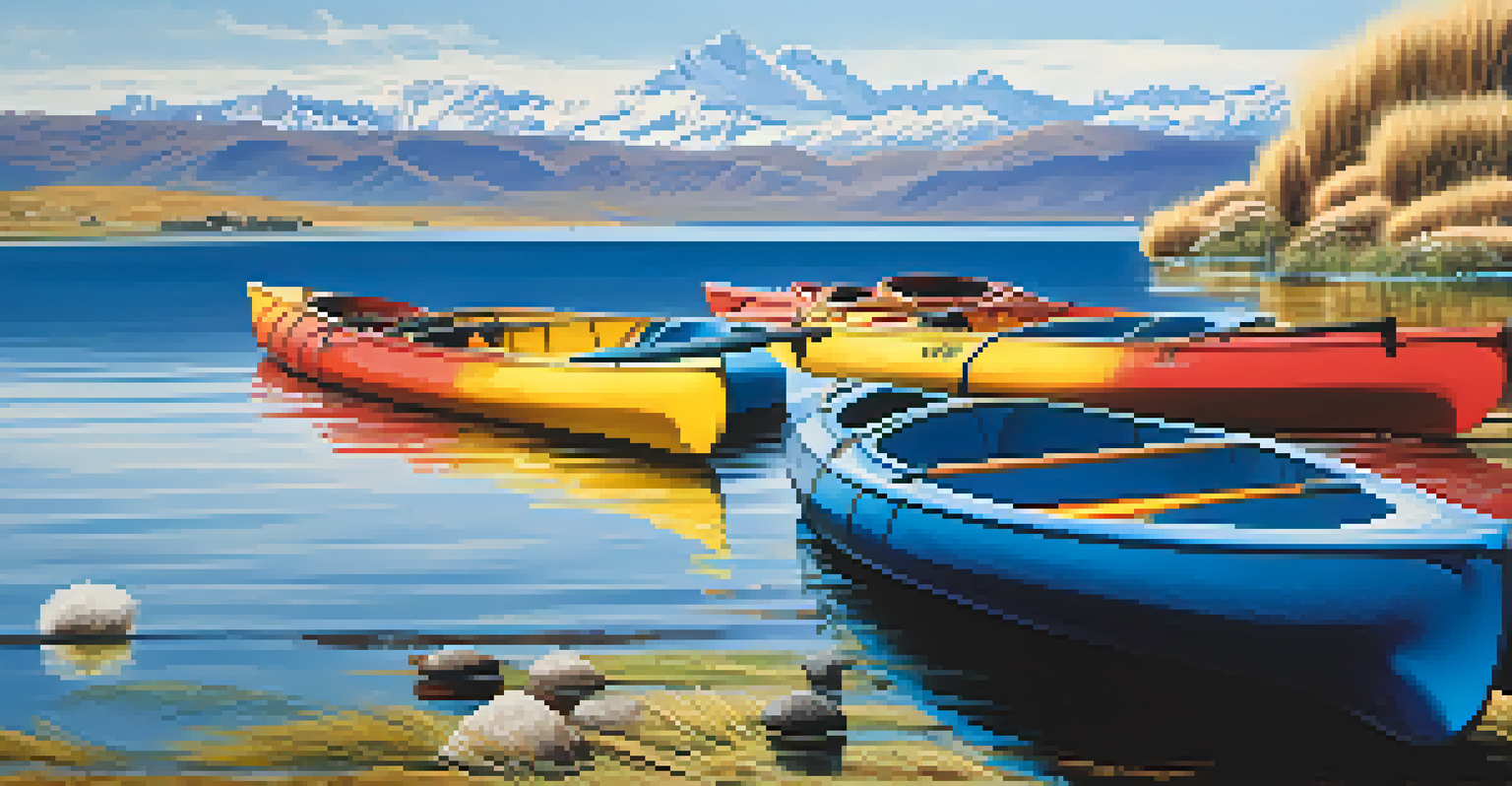Combining Adventure Sports with Eco-Tourism in Peru

The Allure of Peru's Diverse Landscapes
Peru is a land of breathtaking landscapes, from the towering Andes to the lush Amazon rainforest. This diversity not only attracts travelers but also offers countless opportunities for adventure sports. Imagine soaring through the sky while paragliding over the Sacred Valley or navigating the rapids of the Urubamba River while white-water rafting.
The best way to find yourself is to lose yourself in the service of others.
The varied geography makes Peru a playground for thrill-seekers, allowing them to engage in activities like rock climbing, mountain biking, and trekking. Each region has its unique charm, encouraging adventurers to explore off the beaten path while also fostering an appreciation for nature's beauty.
Related Resource
By combining adventure sports with eco-tourism, travelers can enjoy these exhilarating experiences while contributing to the conservation of Peru's stunning ecosystems. This synergy helps protect the environment while satisfying the wanderlust of adventurous souls.
Adventure Sports: A Thrilling Experience
Adventure sports in Peru offer a perfect blend of adrenaline and breathtaking scenery. From the iconic Inca Trail trek to the exhilarating experience of sandboarding in Huacachina, each activity provides a unique way to connect with nature. These sports often require participants to engage with local guides who are knowledgeable about the area's geography and culture.

For example, rock climbing in the picturesque town of Huaraz not only challenges climbers but also surrounds them with stunning views of snow-capped peaks. Similarly, kayaking in Lake Titicaca allows adventurers to explore the world's highest navigable lake while learning about the local communities that inhabit its islands.
Peru's Thrilling Adventure Sports
Adventure sports in Peru offer unique experiences, from trekking the Inca Trail to sandboarding in Huacachina, connecting travelers with nature.
Each of these activities not only delivers excitement but also fosters a deeper understanding of Peru's natural heritage. It encourages travelers to appreciate the importance of protecting these precious landscapes for future generations.
Eco-Tourism: Supporting Local Communities
Eco-tourism goes hand in hand with adventure sports, creating a positive impact on local communities. By choosing eco-friendly activities, travelers contribute to sustainable development and help preserve the environment. For instance, many adventure sports operators in Peru are committed to environmentally responsible practices that benefit both nature and local economies.
In every walk with nature one receives far more than he seeks.
When visitors engage with local guides and participate in community-based tourism initiatives, they directly support families and businesses. This economic boost can lead to better education and resources for local communities, fostering a sense of pride and stewardship over their natural surroundings.
Related Resource
Moreover, eco-tourism encourages travelers to make mindful choices, such as selecting equipment made from sustainable materials or participating in conservation programs. This conscious approach helps ensure that the beauty of Peru remains intact for future adventurers to explore.
Popular Adventure Sports in Peru
Peru offers a wide array of adventure sports, making it a top destination for thrill-seekers. Among the most popular activities are trekking, zip-lining, and surfing. Each sport not only provides excitement but also showcases Peru's stunning landscapes, drawing in adventurers from around the globe.
Trekking the Inca Trail to Machu Picchu is perhaps the most iconic adventure, allowing hikers to immerse themselves in the history and culture of the ancient Incas. On the other hand, surfing in the coastal town of Mancora attracts wave enthusiasts looking for the perfect swell along the Pacific coast.
Eco-Tourism Benefits Local Communities
Eco-tourism in Peru fosters sustainable development, empowering local communities through responsible travel practices.
These activities not only satisfy adrenaline cravings but also highlight the importance of preserving the natural beauty of Peru. As more travelers seek out these experiences, the demand for responsible tourism practices continues to grow.
The Role of Conservation in Adventure Sports
Conservation plays a crucial role in the sustainability of adventure sports in Peru. With the increasing popularity of eco-tourism, there is a growing emphasis on protecting natural habitats and wildlife. Adventure sports operators are often at the forefront of these conservation efforts, promoting responsible practices among participants.
Many organizations work closely with environmental groups to ensure that activities do not harm ecosystems. For instance, regulations are put in place to minimize the impact of trekking and climbing on sensitive areas, helping to preserve trails and rock formations.
Related Resource
Through education and awareness, adventure sports enthusiasts can become advocates for conservation. By respecting nature and supporting eco-friendly businesses, they can help safeguard Peru's stunning landscapes for generations to come.
Responsible Travel Tips for Adventurers
Traveling responsibly is essential for adventurers looking to make a positive impact while enjoying their experiences in Peru. One key tip is to choose local guides who prioritize sustainable practices and have a deep understanding of the environment. This not only enhances the adventure but also ensures that the local economy benefits.
Another important aspect is to pack light and bring eco-friendly gear. Opting for biodegradable products and reusable containers can significantly reduce waste during outdoor activities. Additionally, adventurers should always follow the principles of 'Leave No Trace,' ensuring that they leave the environment as pristine as they found it.
Conservation is Key for Sustainability
Conservation efforts are essential for maintaining Peru's natural beauty, with adventure sports operators promoting responsible practices among enthusiasts.
Lastly, engaging with local communities and learning about their customs fosters respect and appreciation for the culture. This approach not only enriches the travel experience but also strengthens the bond between adventurers and the communities they visit.
Future Trends in Eco-Tourism and Adventure Sports
The future of eco-tourism and adventure sports in Peru looks promising, with an increasing number of travelers prioritizing sustainability. As awareness grows about environmental issues, more people are seeking out experiences that allow them to connect with nature while minimizing their ecological footprint. This trend is encouraging operators to innovate and adopt greener practices.
Moreover, advancements in technology are facilitating eco-friendly solutions, such as electric vehicles for transportation and sustainable gear made from recycled materials. These innovations not only appeal to eco-conscious travelers but also help preserve the environment for future generations.

As the industry evolves, collaboration between adventure sports operators, conservationists, and local communities will be crucial. By working together, they can create a thriving ecosystem of sustainable tourism that benefits both adventurers and the breathtaking landscapes of Peru.